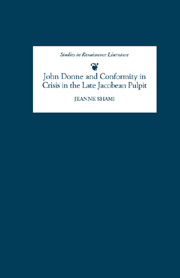Book contents
- Frontmatter
- Contents
- Dedication
- Acknowledgements
- Abbreviations
- 1 “Discreet or religious preachers”: John Donne and the late Jacobean Public Sphere
- 2 “The indiscretion of that foole”: John Knight and the Jacobean Pulpit, 1620–2
- 3 “The fishing of whales”: John Donne's Sermons, 1620–2
- 4 “Faire interpretation”: The Directions and the Crisis of Censorship
- 5 “Wise as Serpents, and innocent as Doves”: Zeal and Discretion in the Pulpit, 1623–5
- 6 “Jesus Wept”: The Journey to Spain and Pulpit Lamentation
- 7 “Blinde buzzards in the choise of a wife”: Sermons and the Moral Marketplace
- 8 “The Lovesick Spouse”: Parliament, Patriots, and the Public Sphere
- 9 “Church-quakes”: Post-Parliamentary Faultlines
- 10 “If the Foundations be Destroyed”: Rules of Engagement
- 11 “Blessed sobriety”: John Donne, the Public Sphere, and Caroline Conformity
- Works Cited
- General Index
- Index to John Donne References
- Index to John Donne's Sermons
- Studies in Renaissance Literature
4 - “Faire interpretation”: The Directions and the Crisis of Censorship
Published online by Cambridge University Press: 12 September 2012
- Frontmatter
- Contents
- Dedication
- Acknowledgements
- Abbreviations
- 1 “Discreet or religious preachers”: John Donne and the late Jacobean Public Sphere
- 2 “The indiscretion of that foole”: John Knight and the Jacobean Pulpit, 1620–2
- 3 “The fishing of whales”: John Donne's Sermons, 1620–2
- 4 “Faire interpretation”: The Directions and the Crisis of Censorship
- 5 “Wise as Serpents, and innocent as Doves”: Zeal and Discretion in the Pulpit, 1623–5
- 6 “Jesus Wept”: The Journey to Spain and Pulpit Lamentation
- 7 “Blinde buzzards in the choise of a wife”: Sermons and the Moral Marketplace
- 8 “The Lovesick Spouse”: Parliament, Patriots, and the Public Sphere
- 9 “Church-quakes”: Post-Parliamentary Faultlines
- 10 “If the Foundations be Destroyed”: Rules of Engagement
- 11 “Blessed sobriety”: John Donne, the Public Sphere, and Caroline Conformity
- Works Cited
- General Index
- Index to John Donne References
- Index to John Donne's Sermons
- Studies in Renaissance Literature
Summary
FAULT LINES IN CONFORMIST SERMONS
WHILE THE Directions for Preachers were issued on 4 August, their official interpretation had to wait for Donne's sermon almost six weeks later. This 15 September sermon was Donne's most important homiletic intervention in the public sphere. Preached by royal command, it was published shortly afterwards, and soon moved into three issues (IV, 15–16). Neither the sermon's publication nor its royal authorization, however, are the chief reasons for according it this significance. Its influence derives primarily from Donne's specific role in interpreting the momentous and controversial change in public policy anticipated in August and September of 1622 in terms that would satisfy political and ecclesiastical authorities as well as the internally divided audience for sermons in the Church of England. Donne's mediation of the crisis of censorship that precipitated the Directions would have significant consequences for the identity of the late Jacobean church.
While it is unlikely that Gowry anniversary sermons for 1622 were responding to the Directions, sermons by Andrewes, Purchas, and Daniel Donne, all subsequently published, establish parameters for interpreting the Directions. Andrewes delivers an “ultraconformist” performance on the theme of nolite me tangere; Purchas, puritan chaplain to George Abbot and John King, delivers a diatribe against all the demons of Jacobean culture, including papists, Jesuits, the powderplotters, anarchy and disorder, the Scots, and the Irish. Daniel Donne, at Paul's Cross, delivers an equivocal sermon on the dangers of religious extremism.
- Type
- Chapter
- Information
- John Donne and Conformity in Crisis in the Late Jacobean Pulpit , pp. 102 - 138Publisher: Boydell & BrewerPrint publication year: 2003



